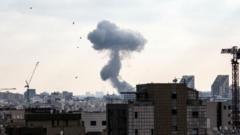The Iranian leadership faces a pivotal decision on how to respond to the US airstrikes. They can either retaliate immediately, bide their time for a later targeted response, or opt for restraint and continue diplomatic negotiations. Each choice carries significant implications for the regime's stability and the broader Middle East.
Iran’s Dilemma: Retaliation or Restraint After US Strikes

Iran’s Dilemma: Retaliation or Restraint After US Strikes
As tensions escalate following recent US airstrikes on Iranian nuclear sites, the Iranian regime grapples with its next strategic move.
Iran is at a crossroads following overnight US airstrikes on its nuclear facilities, vowing revenge with what it terms "everlasting consequences." The conflict escalates as missile exchanges between Iran and Israel persist, prompting intense discussions among Iran's security and intelligence elites. They are weighing whether to retaliate against US interests or heed the call from President Donald Trump for negotiations involving a halt to nuclear enrichment.
Three potential strategies emerge for Iran, all fraught with risks for the regime fighting to maintain its grip on power.
Firstly, a quick and forceful retaliation might satisfy internal demands for vengeance. However, attacking US assets could escalate tensions dangerously in an already volatile region. Iran reportedly still has a stockpile of around 3,000 missiles, but sustained conflict has depleted their resources. Potential targets include approximately 20 US military bases across the Middle East, with options including bases in Iraq and Syria.
Historical context also suggests that Iran has engaged in calculated responses before. Following the US assassination of Quds Force leader Qassim Suleimani in 2020, Iran attacked US troops in Iraq, managing to avoid casualties by issuing warnings. This time, however, a more aggressive stance could be on the table.
Another option could involve Iran using naval power to execute swarming drone assaults against US Navy ships or activating allied forces in Yemen to disrupt shipping around critical maritime routes. Moreover, Iran might explore cyber operations targeting US businesses and networks, utilizing its advanced capabilities.
Alternatively, Iran could choose to delay retaliation until tensions subside, planning a surprise attack when US defenses are potentially lax. Such a strategy carries the risk of renewed US strikes when Iranian civilians begin returning to normalcy.
Lastly, refraining from immediate retaliation could present an opportunity for diplomatic engagement, albeit at the cost of appearing weak after public pronouncements of dire consequences for US actions. Normalizing relations could mean adhering to US and Israeli demands, including the relocation of uranium for enrichment.
Ultimately, Iran's decision must reconcile its desire to retaliate with the delicate balance of regional power dynamics, the stability of the regime, and its influence over the Iranian populace as they navigate through these high-stakes tensions.





















